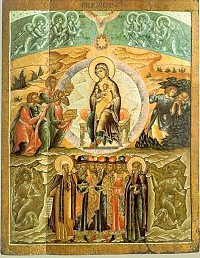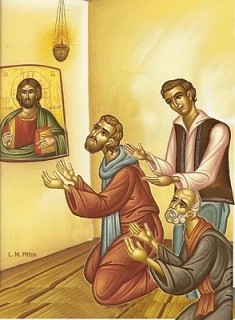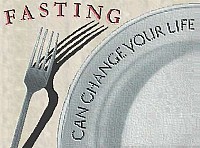A contemporary Orthodox monastic observed that with the four major fasts of the liturgical year, plus the Wednesday and Friday fasts and the various strict fast days, there are more fasting days than non-fasting days in the Orthodox calendar. So important in our struggle is our common ascetical practice in the life of the Church, that we offer here a small collection of teachings from Fathers both ancient and recent, to encourage us in our efforts.
"We have many fasts: four lengthy ones, the Great Fast (Great Lent), the Apostles' Fast, the Dormition Fast and the Nativity Fast; and a number of shorter ones.
"What an amazing and un-Christian relationship so many people now have to these fasts. The fasts are violated by people without a qualm of conscience, as if the matter was about some nonsense which had no significance. The Church, on the other hand, takes a very serious view of the matter...
"Fasting is absolutely indispensable for man. From the external aspect, it is a struggle of filial obedience to God, Who has given us the rules of fasting through His Holy Spirit. From the inner aspect, fasting is a struggle of restraint and self-limitation. In this lies the great value and sense of fasting, since a strict observance of fasts tempers one's will and perfects the character of one who is firm in his religious convictions and actions. Let us not forget that Christ Himself fasted, and foretold that His apostles would also fast.
"We hear people claiming that fasting is harmful to the health. But strict fasting is not required of people who are ill, and they fast only according to their strength. Most important, one should remember that it is only those people who do not fast who speak about the 'harm to health' of fasting. But those who do observe fasting will never say this, for they know from personal experience that not only is fasting not harmful, but it is positively beneficial to bodily health.
"Fasting is not merely a restraining from food. During the days of the fasts, the Church sings, 'While fasting bodily, let us also fast spiritually...' True fasting includes deeds of Christian mercy. It is an alienation of the evil-one, a restraint of the tongue, a laying aside of anger, a cutting off of vices and an exposure of falsehood... Thus, for a Christian, fasting is a time of restraint and self-education in all respects, and a real Christian fast gives believers a great moral satisfaction. The great teacher of Christian asceticism Bishop Theophan the Recluse says of fasting:

Why We Fast
by Fr. Stephen Freeman
Fasting is not very alive and well in the Christian world. Much of that world has long lost any living connection with the historical memory of Christian fasting. Without the guidance of Tradition, many modern Christians either do not fast, or constantly seek to re-invent the practice, sometimes with unintended consequences.
There are other segments of Christendom who have tiny remnants of the traditional Christian fast, but in the face of a modern world have reduced the tradition to relatively trivial acts of self-denial.
I read recently (though I cannot remember where) that the rejection of Hesychasm was the source of all heresy. In less technical terms we can say that knowing God in truth, participating in His life, union with Him through humility, prayer, love of enemy and repentance before all and for everything, is the purpose of the Christian life. Hesychasm (Greek Hesychia=Silence) is the name applied to the Orthodox tradition of ceaseless prayer and inner stillness.
But these are incorrectly understood if they are separated from knowledge of God and participation in His life, union with Him through humility, prayer, love of enemy and repentance before all and for everything.
And it is the same path of inner knowledge of God (with all its components) that is the proper context of fasting. If we fast but do not forgive our enemies – our fasting is of no use. If we fast and do not find it drawing us into humility – our fasting is of no use. If our fasting does not make us yet more keenly aware of the fact that we are sinful before all and responsible to all then it is of no benefit. If our fasting does not unite us with the life of God – which is meek and lowly – then it is again of no benefit.
Fasting is not dieting. Fasting is not about keeping a Christian version of kosher. Fasting is about hunger and humility (which is increased as we allow ourselves to become weak). Fasting is about allowing our heart to break.
I have seen greater good accomplished in souls through their failure in the fasting season than in the souls of those who “fasted well.” Publicans enter the kingdom of God before Pharisees pretty much every time.
Why do we fast? Perhaps the more germane question is “why do we eat?” Christ quoted Scripture to the evil one and said, “Man does not live by bread alone but by every word that proceeds from the mouth of God.” We eat as though our life depended on it and it does not. We fast because our life depends on the word of God.
Much more in the full article, on the OCA website...
~ St John of Kronstadt
+++
"Fasting appears gloomy until one steps into its arena. But begin and you will see what light it brings after darkness, what freedom from bonds, what release after a burdensome life."


